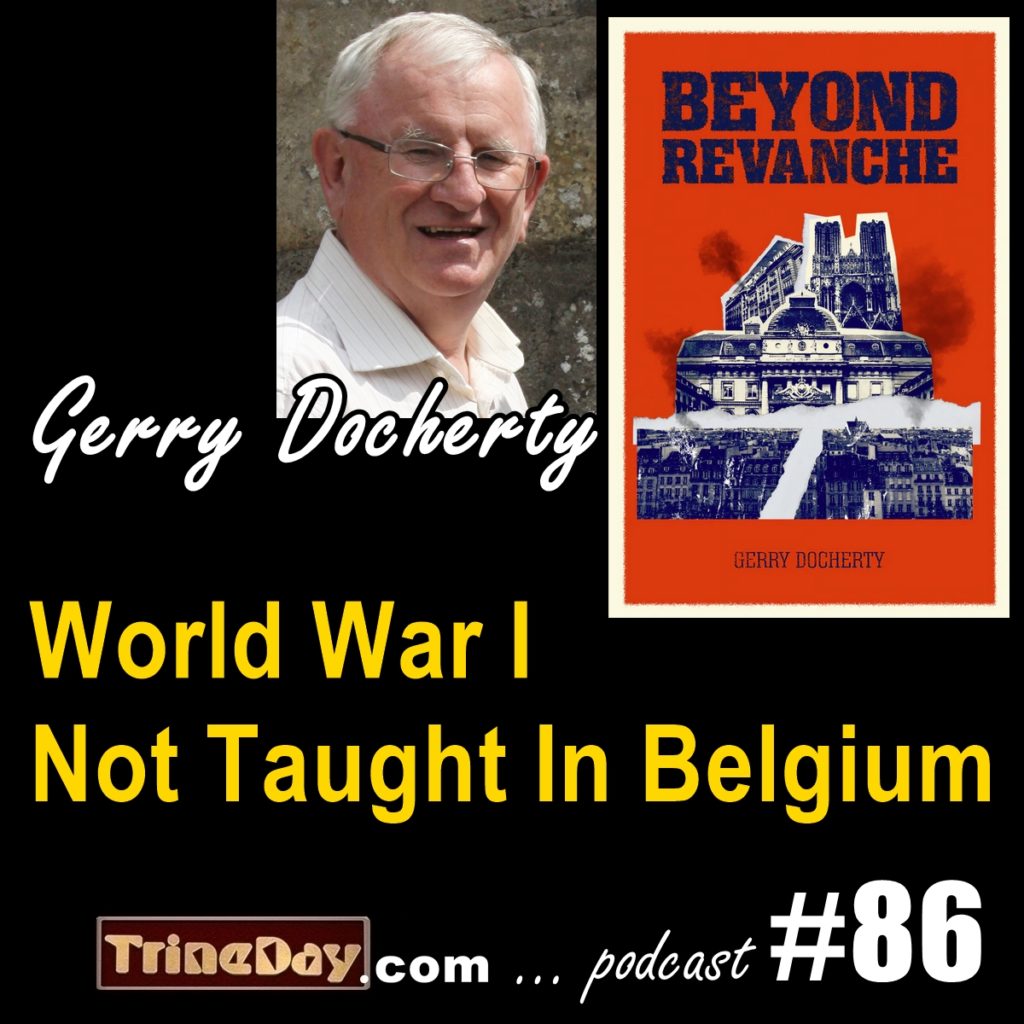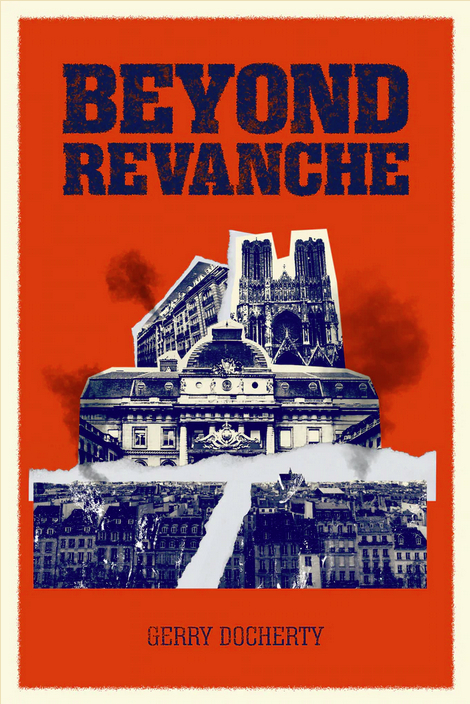The Journey 86. Gerry Docherty: World War I Not Taught In Belgium
Publisher RA “Kris” Millegan talks with Gerry Docherty about his books (“Hidden History: The Secret Origins of the First World War” (Mainstream Publishing) and, by TrineDay, “Prolonging the Agony: How the Anglo-American Establishment Deliberately Extended WWI by Three-and-a-Half Years” – written with Jim Macgregor – and “Beyond Revanche: The Death of La Belle Epoque,” which is available for pre-order at TrineDaydotcom and will be released on April 7, 2022), British coal companies that sold to the enemy during the war, the blockade that let supplies reach Germany, and his 2014 discovery that World War I is not taught in Belgium.

Kris: Some people would rather we not know our history, or they only want us to know the history that they want to push.
Gerry: Governments want to put themselves in a good light and sometimes will do absolutely anything to ensure that. [When Jim and I were writing “Prolonging the Agony”] there was a lot of discussion about cognitive dissonance. If you have been taught something and you deeply believe it, it’s really difficult to challenge these internal thoughts and to accept that there might be another side to this coin.
But when it becomes very evident that you have been misled, it can lead to quite a deep anger that such an impertinence be placed upon the whole country or countries or world, and something really should be done about at least trying to tease out a small part of that.
Kris: You had believed the history you’d been told on World War I for many, many years.
Gerry: And TAUGHT!
Kris: What was the first big thing that you came across that really opened your eyes and made you say, “Boy, I’ve got to dig deeper in this”?
Gerry: A book by [British] Admiral Montagu Consett where he said that the claim that Britain was blockading Germany [the enemy] was absolutely untrue. [We found that it was even argued in Parliament.] The Admiral knew that all of these firms and companies – some were American, but she was not yet at war so that was breaking nothing – but many were British and Britain was at war and many were re-exporting, which was absolutely horrendous. And there were coal companies – can you imagine – coal being the sole fuel, really, for powering just about everything in our country – selling to Germany during the earliest two years of the First World War.
Kris: You book is amazingly detailed and it tells the story of all this complicity and corruption. My friend Tony Sutton produced a book that showed that [during] the Vietnam War, the Russians were supplying the armaments for [North Vietnam], and we allowed all that re-supply to happen so they could have the war.
It boggles the mind when you read your book and you see all the manipulation that was put in place to have the war, and then your book from us, “Prolonging the Agony,” shows how they [extended] the war – why? Why did people do that?

Gerry: I once had a professor who said that, “All wars are economic.” And let’s not forget, at that point in time, they were carving up the world. Germany had many, many holdings throughout Africa, the Middle East, and other parts of the world, and Britain was an empire that wanted to grow into a bigger empire.
And there were groups in Britain, in Russia, and in France – big business. We’re talking about the “Comite des forges.” The Committee of the Forge Masters. The iron and steel makers. Iron and steel makers stand to make mega-bucks when it comes to a war, more so then than today. And there was a lot of bad blood between France and Germany, back to another war.
The key players, I would argue, were in London. But they played a very cautious game. France and Russia had signed [mutual assistance] treaties in the event “someone” – Germany – attacked either of them. Secretly, from about 1906, Britain had also promised to come onboard if this actually transpired.
The backers of this war were basically politicians, who saw in it greatness for themselves. Industrialists. Bankers. War is a delight for bankers in very many cases. And at that time in the States you had J. P. Morgan. Mega-banks who can loan to governments. Families with huge wealth like the Rothschilds. These people had invested in war.
The population through some ridiculous press, publicity and propaganda had been prepared for the outbreak, or the likelihood of it. There had been several false starts, in 1911, 1912. When it happened in 1914, everyone was looking the wrong way. Because in Britain, there was tremendous trouble in Ireland. The headlines were all about the potential for a rebellion in Dublin. The first troops that were amassed for the First World War, in Britain, thought that they were going to be sent to Ireland.
The French were very cautious, too. They didn’t take a single move until they were absolutely certain that the Czar would kick things off, would mobilize his army and come onboard. And that’s exactly what happened. And a lot of that’s covered in “Beyond Revanche: The Death of La Belle Epoque,” which people can order now and will be out April 7.

Kris: You had the Russo-Japanese War of 1905. Basically the bankers were loaning money to both sides. Finally the bankers said, “We aren’t going to loan any more money on this game.” When they made the peace treaty, you had a bunch of Skull and Bones people there.
And armaments have a shelf life. And a lot of time we find that when the shelf life of some of these armaments [is ending], there tends to be conflict because they’ve got to put [their] armaments out there. And they’re [always] developing new armaments, and so they have to have conflicts to see how these new armaments work. And we the people just get the shaft on all of this.
Gerry: We become the victims of the desires and profits of other people. But we mustn’t get pessimistic.
Kris: The more information we get out there and the more that we talk about this, hopefully it’s harder for these people to create these things.
Gerry: I was shocked at a European conference in 2014. It was a commemorative event for the First World War and it was couched very carefully in a great sense of unity and joint regret. There were a number of key people there. The German Ambassador. [Etc.]
The chair of the meeting, a really able and sharp lady, was a principal at one of the universities in Belgium. I asked her, “What do you teach about the war in Belgium schools?” There was a moment of silence and she said, “Oh – we don’t.” I said, “Sorry. Probably [we] lost something in translation. In your school curriculum, in your history, what do you teach about the First World War? Is it about reconciliation? Is it about the hardships?” She said, “It’s not on the curriculum.” I think my jaw hit the floor. I couldn’t believe this.
Kris: If we don’t know where we’ve been, they can try and take us most anywhere. And it’s quite the established fact that World War II was financed a lot by Americans, a lot of the people in Skull and Bones.
Gerry: It’s frightening, actually.









